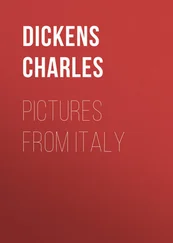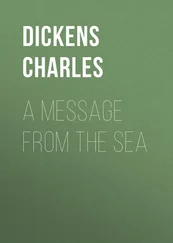Charles Dickens - Pictures from Italy
Здесь есть возможность читать онлайн «Charles Dickens - Pictures from Italy» весь текст электронной книги совершенно бесплатно (целиком полную версию без сокращений). В некоторых случаях можно слушать аудио, скачать через торрент в формате fb2 и присутствует краткое содержание. Жанр: Классическая проза, на английском языке. Описание произведения, (предисловие) а так же отзывы посетителей доступны на портале библиотеки ЛибКат.
- Название:Pictures from Italy
- Автор:
- Жанр:
- Год:неизвестен
- ISBN:нет данных
- Рейтинг книги:5 / 5. Голосов: 1
-
Избранное:Добавить в избранное
- Отзывы:
-
Ваша оценка:
- 100
- 1
- 2
- 3
- 4
- 5
Pictures from Italy: краткое содержание, описание и аннотация
Предлагаем к чтению аннотацию, описание, краткое содержание или предисловие (зависит от того, что написал сам автор книги «Pictures from Italy»). Если вы не нашли необходимую информацию о книге — напишите в комментариях, мы постараемся отыскать её.
Pictures from Italy — читать онлайн бесплатно полную книгу (весь текст) целиком
Ниже представлен текст книги, разбитый по страницам. Система сохранения места последней прочитанной страницы, позволяет с удобством читать онлайн бесплатно книгу «Pictures from Italy», без необходимости каждый раз заново искать на чём Вы остановились. Поставьте закладку, и сможете в любой момент перейти на страницу, на которой закончили чтение.
Интервал:
Закладка:
How it ever IS cleared for the race that takes place at five, or how the horses ever go through the race, without going over the people, is more than I can say. But the carriages get out into the by-streets, or up into the Piazza del Popolo, and some people sit in temporary galleries in the latter place, and tens of thousands line the Corso on both sides, when the horses are brought out into the Piazza—to the foot of that same column which, for centuries, looked down upon the games and chariot-races in the Circus Maximus.
At a given signal they are started off. Down the live lane, the whole length of the Corso, they fly like the wind: riderless, as all the world knows: with shining ornaments upon their backs, and twisted in their plaited manes: and with heavy little balls stuck full of spikes, dangling at their sides, to goad them on. The jingling of these trappings, and the rattling of their hoofs upon the hard stones; the dash and fury of their speed along the echoing street; nay, the very cannon that are fired—these noises are nothing to the roaring of the multitude: their shouts: the clapping of their hands. But it is soon over—almost instantaneously. More cannon shake the town. The horses have plunged into the carpets put across the street to stop them; the goal is reached; the prizes are won (they are given, in part, by the poor Jews, as a compromise for not running foot-races themselves); and there is an end to that day's sport.
But if the scene be bright, and gay, and crowded, on the last day but one, it attains, on the concluding day, to such a height of glittering colour, swarming life, and frolicsome uproar, that the bare recollection of it makes me giddy at this moment. The same diversions, greatly heightened and intensified in the ardour with which they are pursued, go on until the same hour. The race is repeated; the cannon are fired; the shouting and clapping of hands are renewed; the cannon are fired again; the race is over; and the prizes are won. But the carriages: ankle-deep with sugar-plums within, and so be-flowered and dusty without, as to be hardly recognisable for the same vehicles that they were, three hours ago: instead of scampering off in all directions, throng into the Corso, where they are soon wedged together in a scarcely moving mass. For the diversion of the Moccoletti, the last gay madness of the Carnival, is now at hand; and sellers of little tapers like what are called Christmas candles in England, are shouting lustily on every side, “Moccoli, Moccoli! Ecco Moccoli!'—a new item in the tumult; quite abolishing that other item of “ Ecco Fiori! Ecco Fior-r-r!” which has been making itself audible over all the rest, at intervals, the whole day through.
As the bright hangings and dresses are all fading into one dull, heavy, uniform colour in the decline of the day, lights begin flashing, here and there: in the windows, on the housetops, in the balconies, in the carriages, in the hands of the foot-passengers: little by little: gradually, gradually: more and more: until the whole long street is one great glare and blaze of fire. Then, everybody present has but one engrossing object; that is, to extinguish other people's candles, and to keep his own alight; and everybody: man, woman, or child, gentleman or lady, prince or peasant, native or foreigner: yells and screams, and roars incessantly, as a taunt to the subdued, “Senza Moccolo, Senza Moccolo!” (Without a light! Without a light!) until nothing is heard but a gigantic chorus of those two words, mingled with peals of laughter.
The spectacle, at this time, is one of the most extraordinary that can be imagined. Carriages coming slowly by, with everybody standing on the seats or on the box, holding up their lights at arms” length, for greater safety; some in paper shades; some with a bunch of undefended little tapers, kindled altogether; some with blazing torches; some with feeble little candles; men on foot, creeping along, among the wheels, watching their opportunity, to make a spring at some particular light, and dash it out; other people climbing up into carriages, to get hold of them by main force; others, chasing some unlucky wanderer, round and round his own coach, to blow out the light he has begged or stolen somewhere, before he can ascend to his own company, and enable them to light their extinguished tapers; others, with their hats off, at a carriage-door, humbly beseeching some kind-hearted lady to oblige them with a light for a cigar, and when she is in the fulness of doubt whether to comply or no, blowing out the candle she is guarding so tenderly with her little hand; other people at the windows, fishing for candles with lines and hooks, or letting down long willow-wands with handkerchiefs at the end, and flapping them out, dexterously, when the bearer is at the height of his triumph, others, biding their time in corners, with immense extinguishers like halberds, and suddenly coming down upon glorious torches; others, gathered round one coach, and sticking to it; others, raining oranges and nosegays at an obdurate little lantern, or regularly storming a pyramid of men, holding up one man among them, who carries one feeble little wick above his head, with which he defies them all! Senza Moccolo! Senza Moccolo! Beautiful women, standing up in coaches, pointing in derision at extinguished lights, and clapping their hands, as they pass on, crying, “Senza Moccolo! Senza Moccolo!'; low balconies full of lovely faces and gay dresses, struggling with assailants in the streets; some repressing them as they climb up, some bending down, some leaning over, some shrinking back—delicate arms and bosoms—graceful figures –glowing lights, fluttering dresses, Senza Moccolo, Senza Moccoli, Senza Moc-co-lo-o-o-o!—when in the wildest enthusiasm of the cry, and fullest ecstasy of the sport, the Ave Maria rings from the church steeples, and the Carnival is over in an instant—put out like a taper, with a breath!
There was a masquerade at the theatre at night, as dull and senseless as a London one, and only remarkable for the summary way in which the house was cleared at eleven o'clock: which was done by a line of soldiers forming along the wall, at the back of the stage, and sweeping the whole company out before them, like a broad broom. The game of the Moccoletti (the word, in the singular, Moccoletto, is the diminutive of Moccolo, and means a little lamp or candlesnuff) is supposed by some to be a ceremony of burlesque mourning for the death of the Carnival: candles being indispensable to Catholic grief. But whether it be so, or be a remnant of the ancient Saturnalia, or an incorporation of both, or have its origin in anything else, I shall always remember it, and the frolic, as a brilliant and most captivating sight: no less remarkable for the unbroken good-humour of all concerned, down to the very lowest (and among those who scaled the carriages, were many of the commonest men and boys), than for its innocent vivacity. For, odd as it may seem to say so, of a sport so full of thoughtlessness and personal display, it is as free from any taint of immodesty as any general mingling of the two sexes can possibly be; and there seems to prevail, during its progress, a feeling of general, almost childish, simplicity and confidence, which one thinks of with a pang, when the Ave Maria has rung it away, for a whole year.
Availing ourselves of a part of the quiet interval between the termination of the Carnival and the beginning of the Holy Week: when everybody had run away from the one, and few people had yet begun to run back again for the other: we went conscientiously to work, to see Rome. And, by dint of going out early every morning, and coming back late every evening, and labouring hard all day, I believe we made acquaintance with every post and pillar in the city, and the country round; and, in particular, explored so many churches, that I abandoned that part of the enterprise at last, before it was half finished, lest I should never, of my own accord, go to church again, as long as I lived. But, I managed, almost every day, at one time or other, to get back to the Coliseum, and out upon the open Campagna, beyond the Tomb of Cecilia Metella.
Читать дальшеИнтервал:
Закладка:
Похожие книги на «Pictures from Italy»
Представляем Вашему вниманию похожие книги на «Pictures from Italy» списком для выбора. Мы отобрали схожую по названию и смыслу литературу в надежде предоставить читателям больше вариантов отыскать новые, интересные, ещё непрочитанные произведения.
Обсуждение, отзывы о книге «Pictures from Italy» и просто собственные мнения читателей. Оставьте ваши комментарии, напишите, что Вы думаете о произведении, его смысле или главных героях. Укажите что конкретно понравилось, а что нет, и почему Вы так считаете.












